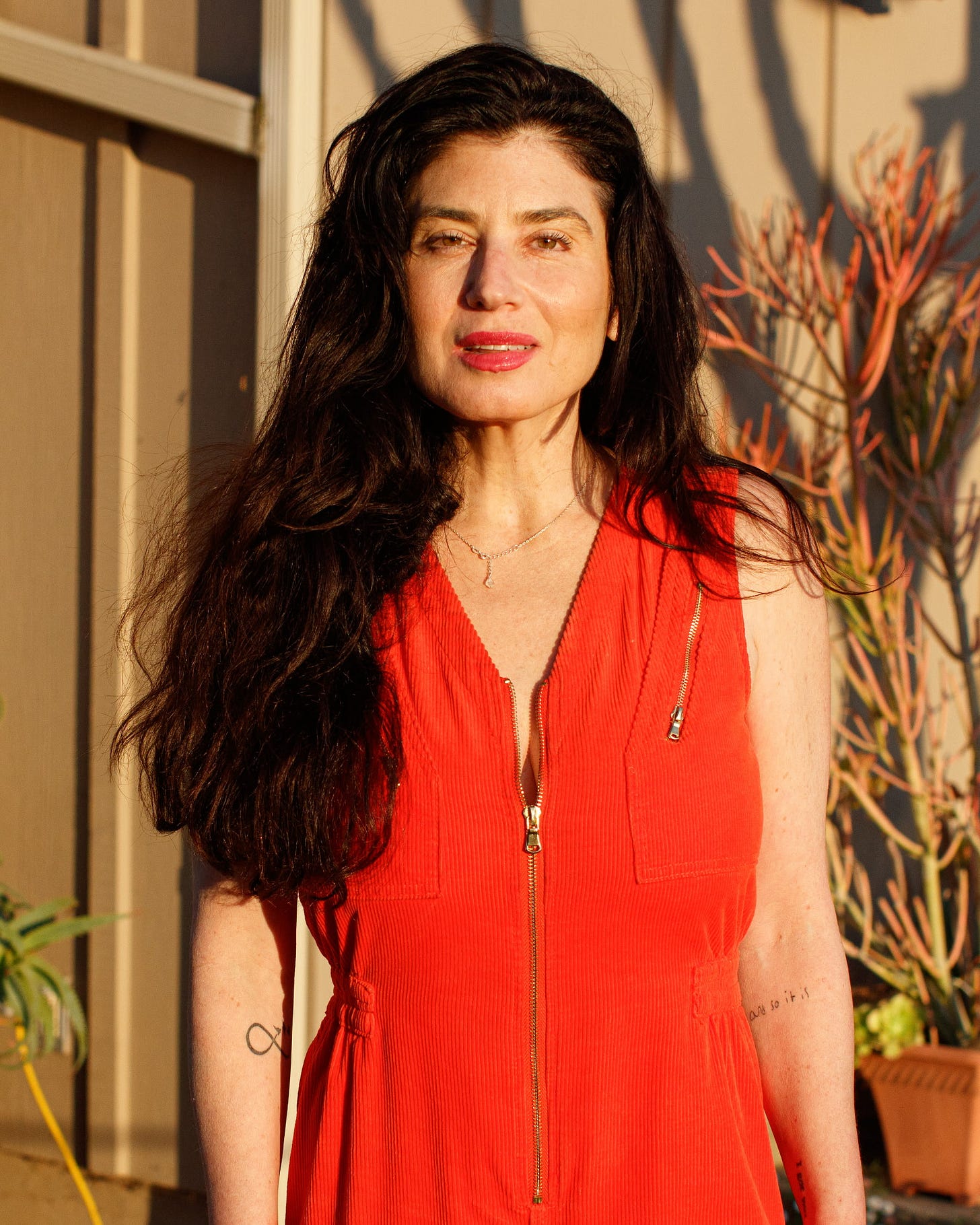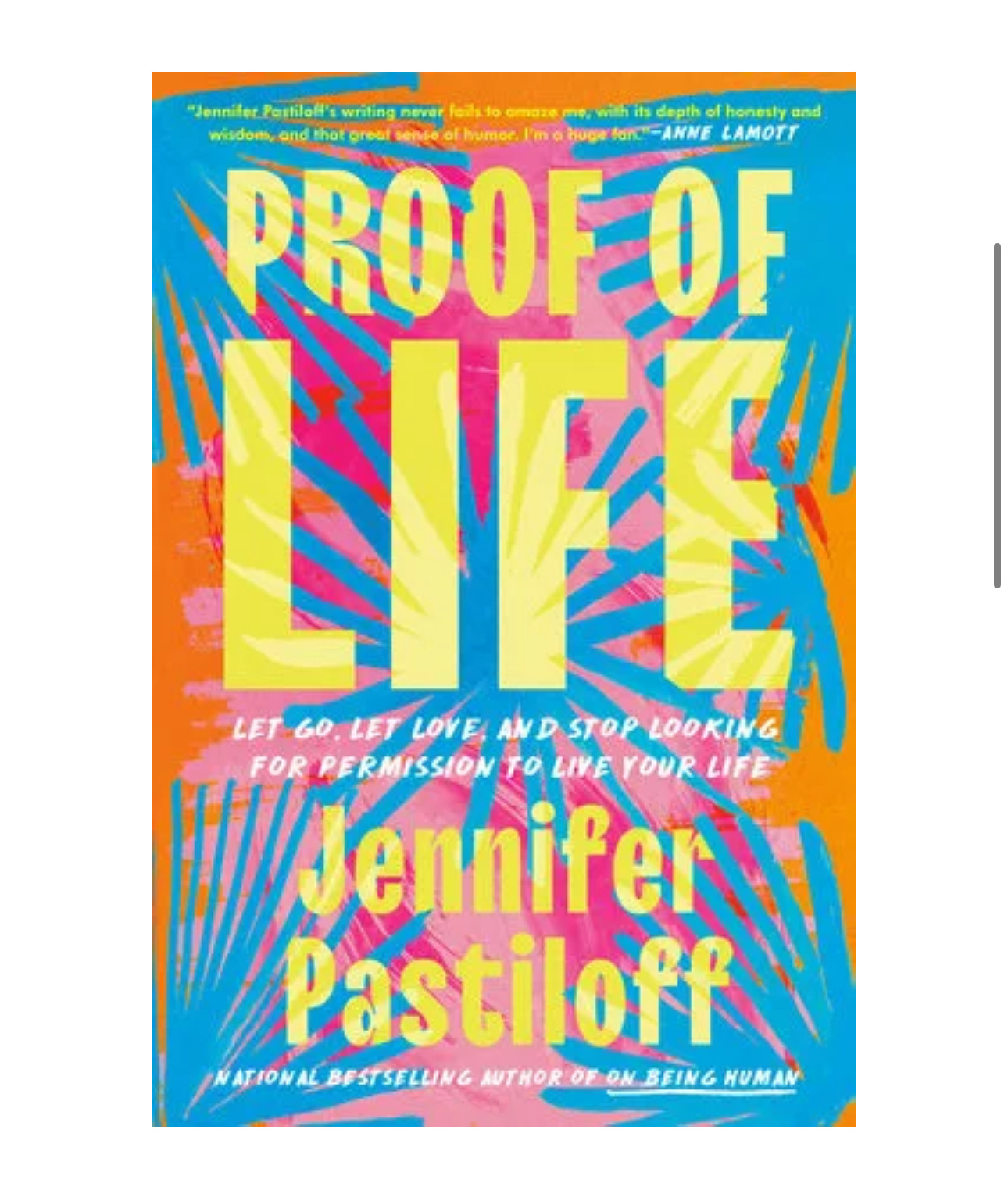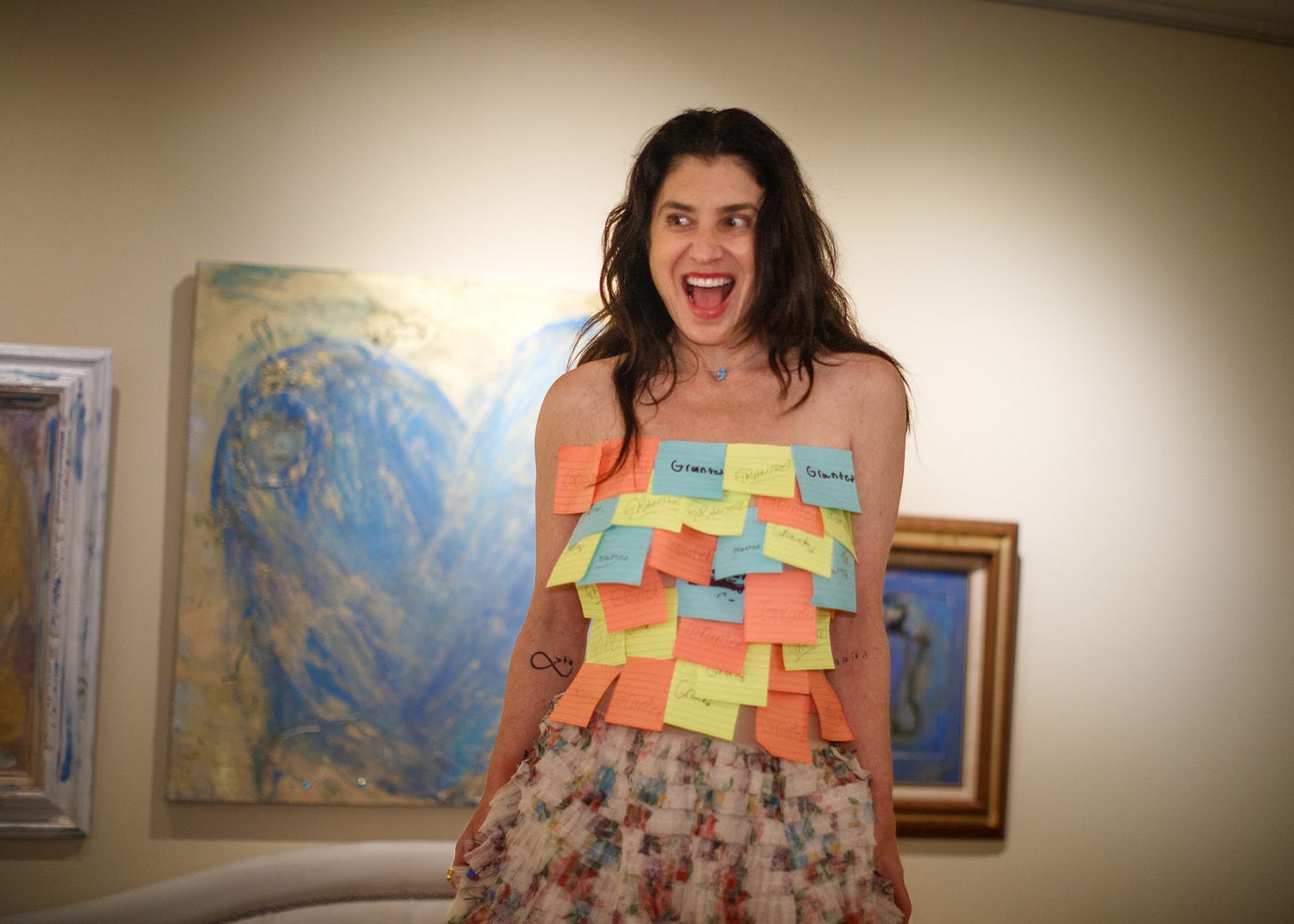We Can Be Alchemists: A Conversation with Jen Pastiloff
On crying, celebrating, being of service, I Got You People, deep listening, Imaginary Time Gods, beauty hunting, and letting ourselves have good things.
Intimate conversations with our greatest heart-centered minds.
changed my life. Back in 2014, deep in the throes of myriad terrifying symptoms from head and brain injury, I wrote about some of what I was living through. Up until that point, I’d only written fiction. But my life had been turned upside down and trusted friends thought it would help to get some of it on the page. So I did.Jen was behind The Manifest-Station then, a glorious online magazine about being human that published so many authors I admired. To me, she was a rockstar. I nervously sent my first ever personal essay and was bowled over when Jen accepted it. We quickly became friends. A few months later, she published a second essay. After that, I started writing for O, The Oprah Magazine, The Sun Magazine, and many others. Without Jen’s support, I’m not sure any of that would have happened. She was also my very first interview for Beyond. So clearly she has a special, radiant place in my heart.
I’m not the only heart that has Jen deeply embedded in it. She’s touched—and helped—so many of us. She leads life-changing retreats in Italy and France (always with a scholarship for a woman who has lost a child) as well as various workshops around America and online. When Covid started, Jen fundraised well over $100,000 for people who were suddenly unable to put food on the table or pay the utilities.
Her bestselling memoir On Being Human uses humor, astounding honesty, and love to inspire the reader to wake up to life. Her new book Proof of Life deepens this journey, encouraging us to consider what we truly want our life to feel like — and to then move toward that. Anne Lamott wrote a blurb for it: “Jennifer Pastiloff’s writing never fails to amaze me, with its depth of honesty and wisdom, and that great sense of humor. I’m a huge fan.” Me, too!
Jen has been featured on Good Morning America, New York Magazine, Health Magazine, CBS News and more. She did a wonderful TED Talk. And she’s working her magic here on Substack with
. She lives in Southern California with her son, the extraordinary Charlie Mel!Enjoy!
xJane
⭐️ Jen is generously gifting three readers an autographed copy of Proof of Life! If you’d like to be one of the recipients, please add “PROOF” after your comment. The winners will be chosen at random on Monday, July 21st and notified by Substack Direct Chat. I’m excited for all of you! (Shipping is limited to the United States) ⭐️
I want to start by talking about crying. I know for a long time you couldn’t. But it sounds like you are again! Yay! Can you share what it was like to lose that ability, why it was so important to you to get it back, and how you got it back?
I stopped crying when I was eight years old and my dad died. I thought I killed him. Which I didn’t. He told me I was being bad and making him not feel good. I said, “I hate you.” And he drops dead. Well, guess what? As an eight-year-old, I think it’s my fault. So my whole entire life I believed I’m bad. It hurts my heart now.
My dad was my best friend, my person. I wanted to die when he died. So what I did was, I said, “I don’t care.” I would chant, “Be strong.” It became a physiological response. Even now when I cry, my body starts to fight itself. I believed I was bypassing grief by being “strong.” It did work for a while—until it didn’t.
How did you get back your ability to cry?
I would purposely watch This Is Us, that’s why I have such a special thing for that show, the dad stuff, and that would make me cry. Or Terms of Endearment would make me cry. But with my own life, because after so many years of having this armor, and this “I will not feel”—I could not access my feelings. I felt I was dead inside. Which I wasn’t. Antidepressants allowed me access to more freedom in terms of not believing my bullshit stories as much. Not ruminating. Seeing a glimmer of possibility.
But I still couldn’t allow myself tenderness or intimacy, until my son turned eight. That was the first time I’ve ever seen myself with any softness. Ever. Ever. Ever. I was 49 when he turned eight. I was like, “Oh my God, that was me.” It’s like in my mind I was 40 when my dad died. I saw this little boy and the floodgates opened.
I’m really happy for you, Jen; I feel like it’s a sign of health—emotional and physical.
I agree. Because energy doesn’t die. Who did I think I was fooling? Myself? The universe? All that stuff I shoved back in, it was going to emerge or affect me my whole life until it found its way out.
Are you grinding your jaw any less now that you’re crying?
No, that’s funny you say that, because I have another tooth that’s broken. I constantly say to people, “let me be a cautionary tale of not expressing your grief. Let it out!”
I clenched my jaw when I was eight with “Be strong,” and I did not unclench. I see myself in videos and I’m incessantly clenching my jaw, and it breaks my heart. I have no idea I'm doing it. I've ruined my teeth and have migraines. The dental assistant, she's so sweet, she's like, “You just have to try to not stress before bed.” And bless her, I wish it was that simple.
That’s so hard, Jen. So much of your beautiful book is a celebration: of self, friendships, family, creativity, love, the world, adventure.
That really makes me happy! Growing up, because I was so serious, the thing I heard the most was: “You need to smile.” So hearing what you just said, it's hard for me to take it in. But I love that because I always say we're not set in stone.
You encourage us to “be willing to let go of the belief that life is something to be tolerated” and instead to consider “What am I not allowing myself to have?” I love this! But things are so hard right now it can be tricky to break out of the mindset of just getting by, just tolerating.
You're right. I was playing with the idea of calling this book You Get to Have This because that was a really profound thing for me. After I bought my house, I was happy and a voice said, “You don't get to be happy.” And I answered — “I know.” But the great thing was I caught myself, and I was like, “Oh, hell no, motherfucker, I do.”
I wrote on a sticky note, “I get to have this” as a reminder. “This” meaning happiness. Because my birthright is not stress — neither is yours. Or anyone reading this.
Life's always going to be hard. Is it nastier and uglier at the moment? Hell yes. It does feel like darkness is more prominent, which is why I love that you brought up the word “celebrate.” We need to do more of that. We need to double down on love and our I Got You People and showing up for each other. We have to consider “Now what?” Your “now what” is going to be different than the person next to you, than me. Your “now what” is, “I'm going to go marching in the street.” Someone else’s is, “I’m going to be kind to a stranger today.” Maybe that sounds like Pollyanna, but if we give in to “that's just the way it is,” we might as well throw in the towel.
Yes, it's shitty out there. Things are terrible. Un-fucking-thinkable things are happening. So it's like, “What can I do?”
You are responsible for so much. I didn’t realize you were the main breadwinner in your family. You have a child. You have your own very challenging health needs. You do so much to help people — including fundraising, often for strangers.
I do want to say I'm not a martyr. It does light me up to be of service. It did get me out of bed when I was very, very depressed to be like, “How can I serve?” The one thing I'm very good at is building community. I don’t care why that is, I just know it’s one of my gifts.
I'm getting all these feelings when you're asking this question, because when my dad died, I decided I had to become the man of the house. It's so much my programming to feel like I'm responsible for everyone. And there's this little girl in me that's like, “I want someone to take care of me.”
How do you carry it all?
I don’t. And I never was. That’s very important. I never was carrying everything. I just believed I had to so it felt like I was. Because my parents treated me like an adult, I stopped being a kid when I was eight. I think that's why I'm so immature and childish and silly and playful. I'm not being flippant. There’re no pictures of me smiling.
Oh, that makes my heart hurt.
Me, too. I recently went into my son’s third grade class and taught them about poetry and doing love and all these things. I had them each write a poem and do art. And I made an anthology for them. We had a book launch day, and I gave each kid a copy. The teacher presented me with a name tag, and said, “You’re part of our third grade class now.”
I started to cry. We can never go back and change what happened. But that gesture was so beautiful.
That sounds so healing for little Jen.
It was. The School of Whatever Works, barring you're not intentionally hurting yourself or anyone else, is whatever works is great. You find ways to help you not only put down what you don't need to carry, but to remember it's not yours to carry. It’s going to be different for everyone, we're all different people and that's why I don't like blanket statements like, “This is the way you breathe.”
One of the ways—and I think you recognize this about our friendship—is your I Got You People. People who see us and remind us, “That's a bullshit story. You don’t have to carry that.” It’s really helpful, especially when they're people that we trust and love.
During Covid I raised all that money to feed people, and everyone associates me with “I Got You.” But it dawned on me that I am not an “I Got You” for myself ever. That’s the big one: do not forget yourself. Find whatever it is that helps you not forget yourself.
You’ve had this practice of beauty hunting for decades. In this book, you write, “We have to remember we, too, are what is beautiful.” That might have been my favorite line of the whole book. That’s what you’re talking about now.
It is. As women whether consciously or not, whether with words or not, we are taught, “Oh, you’re not supposed to do that.” I recorded the audiobook, and I was so proud of myself. I said to Henry, “It’s really good.” And I had a tiny moment where I was like, “How dare I say that?” Then I was really proud of myself because I didn’t shut it down. The messaging—especially for women—is: “Don’t you dare. And you don’t beauty hunt in yourself.”
That’s why people struggle with self-promotion. Because it’s always about what will they think? It’s usually like, “they’ll think I’m getting too big for my britches,” or “I actually like myself. How dare I?” It’s an act of rebellion to find what’s beautiful in ourselves. And how you can be an “I Got You Person for yourself? So many people are like, “But that’s selfish.” So, it’s a lot of unlearning and rewiring and reprogramming and remembering.
I love the idea of remembering, because truthfully, it’s what most of us knew but have forgotten. If you didn’t know it consciously, then you knew in the womb. But somehow life intercepted and we forgot, right?
Oh, Jen, that’s so beautiful. You write about “heart sight,” and how it allows you to re-alive.
That came about because of my deafness. I was thinking about the idea of analyzing our past and do we get insight? And I was like, “No, we get heart sight.” That’s what I’m interested in. Heart sight is that thing that a lot of us have forsaken. Your gut, your intuition, your knowing—and our body tells us. And for so long I wasn’t in my body.
And talking about that with my friend Kirby, she said “realize,” like, “did you realize…” but I heard “re-alive.” I wrote it down because I love that.
It’s beautiful.
It was a mistake I heard. If I didn’t have a sense of humor about my deafness, and some days I don’t, I can feel stupid all the time. I can tell myself, “Jen, you’re not stupid.” I know that up here. But embodying a thing and knowing a thing, for me, often are very different. Let me tell you, sitting in a room with people talking and not knowing what’s going on, and laughing when you don’t know why you’re laughing, I feel stupid. I love that I can laugh at myself and discover new words.
I love that for you. You made a post not too long ago about how hard it was when you recently lost your hearing aids. I don't think people who don't have any kind of chronic health challenges really understand what it's like to have them so integrated into your life.
My hearing is getting worse lately. That creates a panic in me, because what if one day there’s nothing, there's no sound. I don't know ASL. Nor do my friends or family. I'm small "d" deaf. I use hearing aids and lip reading. Without them I can't hear.
But even with them I have to work very, very hard. And group settings? Forget about it. Even with my hearing aids. I feel a lot of shame around this. I've gotten better at asking for what I need. For example, people say, “You want to have dinner?” I'm good now going, “Can we go to someone's house?” Or I decline. That makes me proud of myself, because it's not that often that most of us actually say no without an apology, or say what we really need.
People frequently ask me, “If you could reverse your head and brain injury, would you?”
Oh, that’s a tricky one.
I know! How do you feel about that with your hearing? Would you reverse that?
No one’s asked me that although I’ve thought about it. It does surprise me to say, no, I wouldn’t trade it, because so much magic has come from it. And yet, we can hold more than one thing. Some days it's so maddening, and I feel sorry for myself, and I fucking hate it.
I said this on my TED Talk, the things that make us our magical, weirdo, unique selves are invisible. A lot of my way of being is a direct result of my profound hearing loss. I joke that I’m a witch, but I’m not joking. There’s an intuition I have that—who knows if it’s because of my hearing loss?
I do know that I listen in a different way, because I can’t rely on my ears like other people. You’ve been to my in-person workshop. People will be on the mat, and I have to pretty much get in your face to hear you. That’s very disarming and terrifying, but in the same breath, it’s fucking amazing. Because all most people want is to be seen and heard.
You have no doubt I’m right there with you, and it’s intimate. Let me tell you, if I was a typical hearing person, no way would I do that. That would be like, “Okay, lady, what is wrong with you?” But because I’m deaf, I get to sit in your lap.
It’s enhanced my compassion. It has enhanced my sense of humor. I’m not saying I’m funny—that’s debatable. But what I’m saying is that it’s forced me to continuously seek out levity, because if I didn’t, I wouldn’t get out of bed.
So it’s given me a lot. I will not bypass, though, when something hard or tragic happens and go right to, “Well, there’s going to be a gift in it,” because I think that’s bullshit.
Oh god, that drives me fucking nuts. “Everything happens for a reason.” You live through this.
I want to punch someone in the eye. But I do think we can be alchemists. We can turn it into a gift. We can transform energy.
Beautiful. You write about The Imaginary Time Gods and all the ways that we have of believing that our lives are not running on time. You’ve experienced this yourself.
All my life, I was called a late bloomer. I never questioned it. I would even say it about myself. But then I have to go, “But wait, wait, wait! Late according to whom?” We can’t answer that. It’s this hilarious unspoken or spoken timeline that we’re meant to adhere to. “Okay, by this point in your life you’re supposed to X, Y, and Z.” And we buy into it, especially for women. And that behooves all the billion-dollar companies that make money off us feeling like we’re old and ugly and behind and broken, right?
If I’m leading a workshop with a hundred women, and I say, “How many of you feel like you’re behind?” I swear, 80–90% raise their hand. Here’s what’s even more interesting—they don’t even know behind what. Or according to who? It’s heartbreaking. The women who don’t raise their hand are always women sixties and above, who are my favorite. They just don’t got fucks left to give. They’re like, “Yeah, no more permission.”
Have you found ways to take that pressure off yourself?
Some days. Other days, I’m like, “Look at you, fraudy fraudaton.” But I’m able to catch myself go, “Hold up.” For example, On Being Human came out in 2019, and I was like, “Oh, my god! Other writers would have another book out by now. It’s been six years!” I have to remind myself, “Who cares? It doesn't matter.” So no, I'm not completely like angels are floating around me all the time. But I want to have role model behavior. Meaning, I want to be who I say I am.
The whole thing with age, I'm never going to apologize for it, I'm never going to lie about it. All that “Oh, youth is better” and “you become less valuable as you age,” all that bullshit; I want to hold myself accountable if I buy into that.
One of the ways to do this is by being honest and open about myself and noticing that no one’s scurrying to the hills. In fact, people are often grateful. Not that I need external validation—but I'll be damned if it doesn't help sometimes. When people say, “You can't care what people think,” I roll my eyes. Because that's a sociopath.
So true.
It’s only a problem when you're immobilized by it, when you can’t function without it. But when I'm open and true to myself, people thank me. And then that encourages other people. So it becomes this reciprocity thing.
So much is hard right now. Where are you finding joy?
With you. With my I Got You People. It doesn’t have to be in person. But community is where I find God. It doesn’t have to be a group. But right now, with heartfelt connection—even if we’re crying—that heartfelt connection lights me up.
And I’m seven months sober, and it’s really incredible to experience joy unaltered! Because I like to be altered. My father was a drug addict. Drugs aren’t my choice, but I like to be jacked up on coffee. My dad was Uppers and Downers, and I was the same. Just our drugs of choice were different.
But now I’m present, and I’m able to find joy. My favorite is joy for no reason.
My best friend—who is someone I met later in life—we constantly delight. If you met us, you’d think we’d been friends since we were little girls. It’s my most intimate relationship, besides my partner, Henry. It makes me giddy because I’ve never had it in my life, which feels weird to say. But it’s that deep.
And my son. He’s getting older now, and he’s got this sense of humor that my dead dad had. I am so proud. He could be dumb as a rock, but is so funny. And so it brings me such joy.
I love that!
If you enjoyed this interview with Jen, you might also enjoy this one with Lidia Yuknavitch:
⭐️⭐️Beyond is a reader-supported publication that pays contributors. Thank you to everyone who’s joined this beautiful, growing community devoted to bringing as much light as possible into this world of ours. If you would like to support my work, please consider becoming a paid subscriber. Beyond cannot exist without you! ⭐️⭐️















Beautiful conversation with a beautiful human! Today I’m going to feel joy for no reason. PROOF
I related to much of what Jen says in this beautiful conversation. This is one thing that deeply resonates right now for me: "That’s why people struggle with self-promotion. Because it’s always about what will they think? It’s usually like, “they’ll think I’m getting too big for my britches,” or “I actually like myself. How dare I?” It’s an act of rebellion to find what’s beautiful in ourselves. And how you can be an “I Got You Person for yourself? So many people are like, “But that’s selfish.” So, it’s a lot of unlearning and rewiring and reprogramming and remembering."
A lot of unlearning and confirming our self-worth on a regular basis. We are all deserving. I need to practice telling myself "I got you!" on the daily. Thank you Jane and Jen! Proof ✨✨